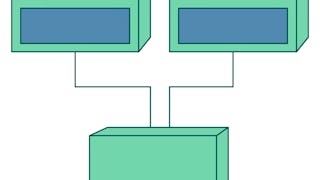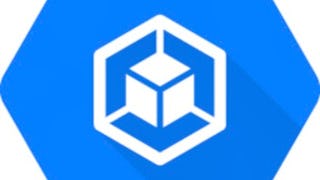- Browse
- Software Architecture
Software Architecture Courses Online
Master software architecture for designing scalable systems. Learn about architectural patterns, design principles, and system integration.
Explore the Software Architecture Course Catalog
 Status: NewNewStatus: Free TrialFree Trial
Status: NewNewStatus: Free TrialFree TrialSkills you'll gain: Business Analysis, Cloud-Native Computing, Identity and Access Management, Data Migration, Software Architecture, Stakeholder Analysis, Process Optimization, Extract, Transform, Load, Systems Design, Systems Architecture, Stakeholder Management, Data Integration, Cybersecurity, Business Process Modeling, Release Management, Enterprise Architecture, Project Management, Software Testing, Information Technology, Software Design Patterns
4.8·Rating, 4.8 out of 5 stars290 reviewsBeginner · Professional Certificate · 3 - 6 Months
 Status: Free TrialFree TrialU
Status: Free TrialFree TrialUUniversity of Alberta
Skills you'll gain: Software Architecture, Model View Controller, Unified Modeling Language, Object Oriented Design, Service Oriented Architecture, API Design, Systems Architecture, Web Services, Software Design Patterns, Software Design, Simple Object Access Protocol (SOAP), Microservices, Restful API, Software Design Documents, Software Visualization, Code Review, Solution Architecture, Object Oriented Programming (OOP), Java, Software Development
4.6·Rating, 4.6 out of 5 stars4K reviewsBeginner · Specialization · 3 - 6 Months
 Status: NewNewStatus: Free TrialFree TrialE
Status: NewNewStatus: Free TrialFree TrialEEdureka
Skills you'll gain: API Design, API Gateway, Application Programming Interface (API), Postman API Platform, Restful API, Data Validation, Authentications, OAuth, Cloud API, Microservices, Application Deployment, CI/CD, Open Web Application Security Project (OWASP), Authorization (Computing), Application Frameworks, Performance Tuning, Application Lifecycle Management, Test Automation, Prometheus (Software), Grafana
Intermediate · Specialization · 1 - 3 Months
 Status: Free TrialFree TrialU
Status: Free TrialFree TrialUUniversity of Alberta
Skills you'll gain: Software Architecture, Unified Modeling Language, Systems Architecture, Software Design, Software Design Documents, Software Visualization, Solution Architecture, Software Development, Software Documentation, Software Design Patterns, Enterprise Architecture, Maintainability, Scalability, Databases
4.5·Rating, 4.5 out of 5 stars935 reviewsIntermediate · Course · 1 - 4 Weeks
 Status: Free TrialFree Trial
Status: Free TrialFree TrialSkills you'll gain: Software Development Life Cycle, Software Architecture, Software Design, Scrum (Software Development), Software Engineering, Software Design Patterns, Agile Methodology, Software Development, Programming Principles, Application Development, Cloud Development, Web Development, Back-End Web Development, Front-End Web Development, Computer Programming, Integrated Development Environments, Python Programming
4.7·Rating, 4.7 out of 5 stars4.2K reviewsBeginner · Course · 1 - 3 Months
 Status: Free TrialFree TrialG
Status: Free TrialFree TrialGGoogle Cloud
Skills you'll gain: Kubernetes, Google Cloud Platform, Cloud Infrastructure, Prompt Engineering, Containerization, Identity and Access Management, Cloud-Native Computing, CI/CD, Cloud Storage, Application Deployment, Cloud Management, Cloud Services, Virtual Machines, Scalability, Cloud Computing, Docker (Software), Application Development, Load Balancing, Generative AI Agents, Continuous Integration
4.6·Rating, 4.6 out of 5 stars5.2K reviewsBeginner · Specialization · 3 - 6 Months
What brings you to Coursera today?
 Status: Free TrialFree TrialC
Status: Free TrialFree TrialCCoursera
Skills you'll gain: Cloud Computing Architecture, Cloud Infrastructure, Scalability, Cloud Computing, Cloud Platforms, Software Architecture, Cloud Services, Cloud Applications, Cloud Security, Infrastructure As A Service (IaaS), Load Balancing, Serverless Computing, Software Design Patterns, Microservices, Event-Driven Programming
4.7·Rating, 4.7 out of 5 stars32 reviewsBeginner · Course · 1 - 4 Weeks
 Status: Free TrialFree TrialA
Status: Free TrialFree TrialAAmazon Web Services
Skills you'll gain: AWS Identity and Access Management (IAM), Amazon CloudWatch, Data Lakes, Amazon DynamoDB, Amazon Web Services, Serverless Computing, Cloud Computing, Amazon S3, Scalability, Amazon Elastic Compute Cloud, Event-Driven Programming, Cloud Security, Solution Architecture, Data Visualization, Identity and Access Management, Cloud Storage, Data Architecture, Software Architecture, Cloud Computing Architecture, API Gateway
Build toward a degree
4.8·Rating, 4.8 out of 5 stars6.9K reviewsIntermediate · Professional Certificate · 3 - 6 Months
 Status: NewNewStatus: Free TrialFree Trial
Status: NewNewStatus: Free TrialFree TrialSkills you'll gain: Software Architecture, Systems Development Life Cycle, Systems Architecture, Systems Thinking, Software Design Patterns, Stakeholder Communications, Systems Analysis, Application Design
Beginner · Course · 1 - 3 Months
 Status: Free TrialFree TrialStatus: AI skillsAI skills
Status: Free TrialFree TrialStatus: AI skillsAI skillsSkills you'll gain: CI/CD, Open Web Application Security Project (OWASP), Continuous Integration, Software Development Life Cycle, Software Architecture, Istio, Linux Commands, Agile Software Development, Cloud Computing Architecture, Application Deployment, Test Driven Development (TDD), Kubernetes, Gherkin (Scripting Language), Restful API, Git (Version Control System), DevOps, Grafana, Software Engineering, Data Import/Export, Application Development
Build toward a degree
4.6·Rating, 4.6 out of 5 stars63K reviewsBeginner · Professional Certificate · 3 - 6 Months
 Status: Free TrialFree TrialU
Status: Free TrialFree TrialUUniversity of Colorado Boulder
Skills you'll gain: Service Level, Software Engineering, Data Architecture, Web Applications, Software Architecture, Performance Testing, Scalability, Functional Requirement, Distributed Computing, Databases, Microservices, Acceptance Testing, Application Deployment, Application Development, Predictive Modeling, Software Testing, Development Testing, System Design and Implementation, Transaction Processing, Big Data
Build toward a degree
3.5·Rating, 3.5 out of 5 stars102 reviewsAdvanced · Specialization · 1 - 3 Months
 Status: FreeFreeP
Status: FreeFreePPrinceton University
Skills you'll gain: Microarchitecture, Computer Architecture, Hardware Architecture, Computer Systems, Computer Engineering, Systems Architecture, Operating Systems, Performance Tuning, Scalability
4.7·Rating, 4.7 out of 5 stars3.7K reviewsAdvanced · Course · 3 - 6 Months
Software Architecture learners also search
In summary, here are 10 of our most popular software architecture courses
- IBM Systems and Solutions Architect: IBM
- Software Design and Architecture: University of Alberta
- API Development and Architecture: Edureka
- Software Architecture: University of Alberta
- Introduction to Software Engineering: IBM
- Architecting with Google Kubernetes Engine: Google Cloud
- Cloud Architecture Design Patterns: Coursera
- AWS Cloud Solutions Architect: Amazon Web Services
- Introduction to Systems Architecture : IBM
- IBM DevOps and Software Engineering: IBM
Frequently Asked Questions about Software Architecture
Software architecture describes a computing system or program's structure, as well as the decisions that are made about how software systems are organized and how structural elements are selected. It integrates elements like object-oriented analysis and design, web service, and representational state transfer (REST), to create software applications and systems that are flexible and reusable. There are five patterns in software architecture, including layered, event-driven, microkernel, microservices, and space-based.
Learning software architecture is essential for building systems that will last. You'll discover techniques for building software that's flexible and scalable all while making informed design decisions that allow you to execute safer, faster, better software and for less money. You'll receive training in programming, systems design and development operations, all of which allow you to progress in your career or enter a new industry. You'll get skills in software development and gain the ability to execute solutions and lead a team of software engineers.
Typically, software architects study software architecture. There's a fair amount of variance in the titles you'll see. Other job titles you might encounter include application architects, enterprise architects, solutions architects, and technical architects. For some, it's the next step in their careers after becoming a senior developer. For anyone who wants to enter the field directly, there are entry-level positions to get you started. Software architects commonly work in an office environment, although you may have remote work opportunities available to you as well. If this is a career you're interested in, expect to spend the majority of your work time sitting in front of a computer.
People ideally suited for working in software architecture have a mixture of solid technical skills and leadership qualities because working in software architecture requires taking the technical lead on projects. While project managers deal with resources and scheduling, the software architect makes technical decisions, organizes the team, and contributes to planning activities around the architecture. Other traits that are useful to have include design skills, programming skills, and a background in or a good understanding of the software development process. Having knowledge of the business domain is also helpful since it provides insight into the requirements that will have to be considered to create solutions that best solve the problem.
Online Software Architecture courses offer a convenient and flexible way to enhance your knowledge or learn new Software Architecture skills. Choose from a wide range of Software Architecture courses offered by top universities and industry leaders tailored to various skill levels.
When looking to enhance your workforce's skills in Software Architecture, it's crucial to select a course that aligns with their current abilities and learning objectives. Our Skills Dashboard is an invaluable tool for identifying skill gaps and choosing the most appropriate course for effective upskilling. For a comprehensive understanding of how our courses can benefit your employees, explore the enterprise solutions we offer. Discover more about our tailored programs at Coursera for Business here.










